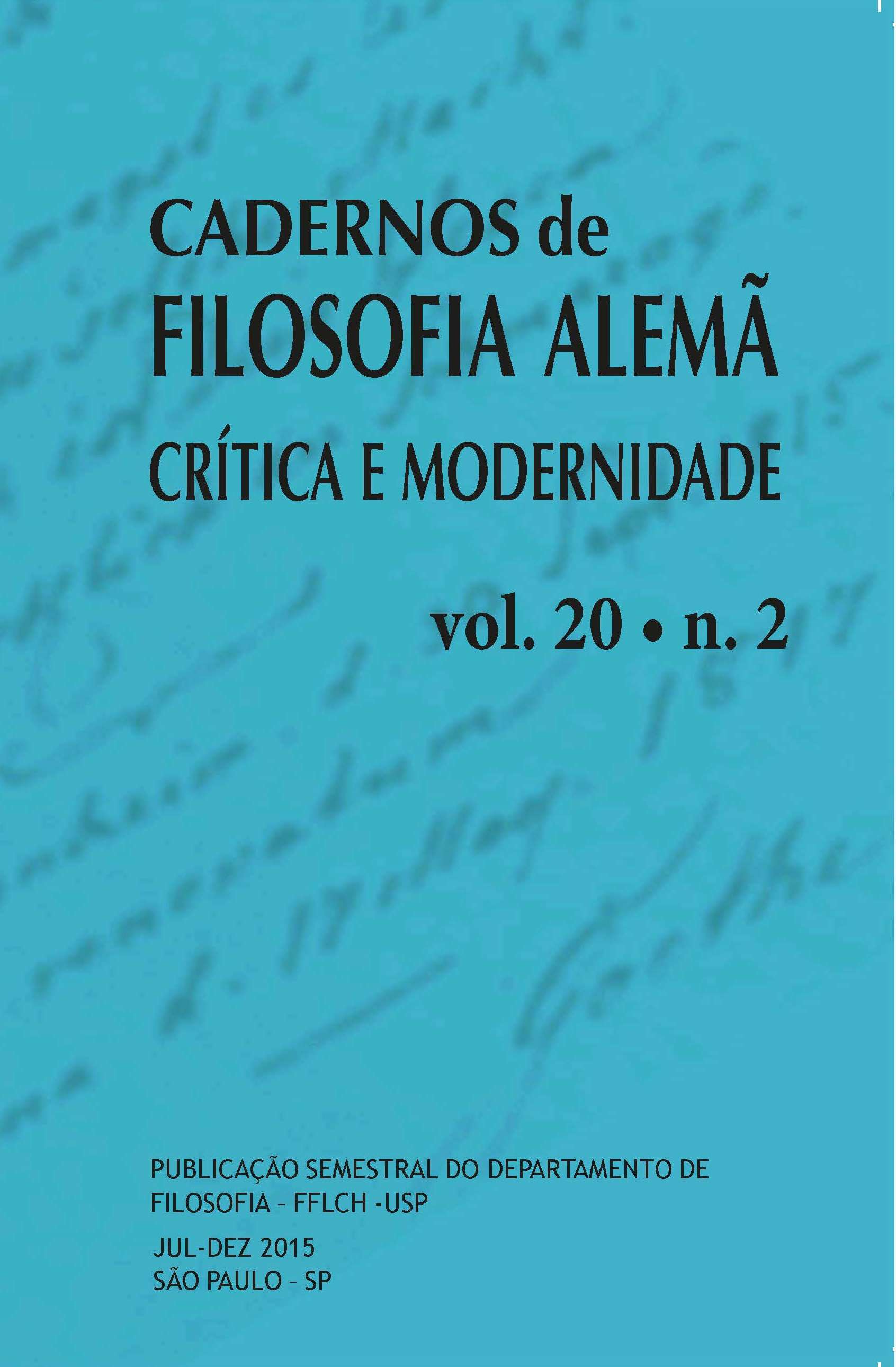Transcendents or transcendentals? An essay on Kant and the Scholastics’ mistake
DOI:
https://doi.org/10.11606/issn.2318-9800.v20i2p179-200Keywords:
transcendent, transcendental, metaphysics, Immanuel Kant, John Duns Scotus.Abstract
The term “transcendental” has been of fundamental importance to the discussions produced in the many fields of Contemporary Philosophy. This is mostly due to the fact that Kant’s philosophy has been the undeniable and constant reference to authors from the 19th to the 21st century. Hence is derived the problematic projection of the notion of “transcendental” over the philosophy of medieval scholastic authors. Although the latter would use the term “transcendent”, they did not even know the term “transcendental”. The confusion of both could not be any more harmful to the reading of medieval authors.Downloads
References
AERTSEN, J. A. Medieval Philosophy and Transcendentals. The Case of Thomas Aquinas. Leiden - New York – Köln: Brill, 1996.
_________. Medieval Philosophy as Transcendental Thought. From Philip the Chancellor (ca. 1225) to Francisco Suárez. Leiden: Brill, 2012.
CHARRON, P. de. De la Sagesse. In: ________. Toute les oeuvres de Pierre Charron parisien, docteur es droicts, chantre et chanoine Theologal de Condom. Dernière edition. Reveues, corrigees et augmentées. Paris: Chez Jaques Villery, 1635.
CROSS, R. ‘Where Angels Fear to Tread’: Duns Scotus and Radical Orthodoxy. Antonianum, 76, 2001, pp.7-41.
DE MURALT, A. “Kant, le dernier occamien: une nouvelle définition de la philosophie moderne”. In: _________. La métaphysique du phénomène. Les origines médiévales et l’élaboration de la pensée phénoménologique. Paris: Vrin, 1985, pp.138-159.
DOYLE, J. P. Between Transcendental and Transcendental: the Missing Link?. The Review of Metaphysics, 50.4, 1997, pp.783-815.
GILSON, É. Avicenne et le point de départ de Duns Scot. Archives d’histoire doctrinale et littéraire du Moyen Âge, 1927, pp.89-149.
_________. Jean Duns Scot. Introductio à ses positions fondamentales. Paris: Vrin, 1952, pp.97-8.
_________. The Unity of Philosophical Experience. San Francisco: Ignatius Press, 1999 (1937).
HABERMAS, J. “Wahrheitstheorien”. In: _________. Vorstudien und Ergänzungen zur Theorie des kommunikativen Handelns. Frankfurt am Main: Surkhamp Verlag, 1984, pp.187-225.
HONNEFELDER, L. Scientia transcendens. Die formale Bestimmung von Seiendheit und Realität in der Metaphysik des Mittelalters und der Neuzeit. Hamburg: Felix Meiner, 1990.
_________. Johannes Duns Scotus. München: Beck, 2005.
IOANNES DUNS SCOTUS. Opera omnia. Cura et Studio Commissionis scotisticae. Vaticano: Typis Polyglottis Vaticanis, 1950-.
_________. Opera philosophica. Ed. St. Bonaventure University. St. Bonaventure: The Franciscan Institute, 1997-2006.
KANT, I. Kritik der reinen Vernunft. Herausgegeben von Wilhelm Weischedel. 2 Bd. Frankfurt am Mein: Suhrkamp Verlag, 1974.
_________. Crítica da razão pura. Tradução de Manuela Pinto dos Santos e Alexandre Fradique Morujão. Introdução e notas de Alexandre Fradique Morujão. Lisboa: Fundação Calouste Gulbekian, 2001.
KANTII, I. Opera ad philosophiam criticam. Vol. 1 – cui inest Critica rationis purae. Latine vertit Fredericus Gottlob Born. Lipsiae: Impensis Engelhard Beniamin Schwickerti, 1796.
KNITTERMEYER, H. Der Terminus transszendental in seiner historischen Entwicklung bis zu Kant. Inaugural-Dissertation zur Erlangung der Doktorwürde der Hohen Philosophischen Fakultät der Universität Marburg. Marburg: Buchdruckerei von Joh. Hamel, 1920.
LEISEGANG, H. Über die Behandlung des Scholastischen Satzes: „Quodlibet ens est unum, verum, bonum seu perfectum“, und seine Bedeutung in Kants Kritik der reinen Vernunft. Kantstudien, 20.2-3, 1915, pp.403-21.
LIBERA, A. de. L’art des généralités. Théories de l’abstraction. Paris: Aubier, 1999.
POPKIN, R. The History of Scepticism. From Savonarola to Bayle. Oxford: Oxford University Press, 2003.
RIJK, L. M. de. “The Aristotelian Background of Medieval transcendentia: a Semantic Approach”. In: PICKAVÉ, M. (Hrsg.). Die Logik des Transzendentalen. Festschrift für Jan A. Aertsen zum 65. Geburtstag. Berlin, New York: De Gruyter, 2003, pp.3-22.
SONDAG, G. “Universel et natura communis dans l’Ordinatio et dans les Questions sur le Perihermeneias (une brève comparaison)”. In: HONNEFELDER, L., WOOD, R., DREYER, M. (eds.). John Duns Scotus: Metaphysics and Ethics. Leiden - New York – Köln: Brill, 1996, pp.385-391.
WOLTER, A. The Transcendentals and their Function in the Metaphysics of Duns Scotus. St. Bonaventure: The Franciscan Institute, 1946.
Downloads
Published
Issue
Section
License
Information and conceptions on the texts are complete responsibility of the authors.
All the articles submitted before July 5th 2018 and those published after July 2021 are licensed under a CC BY-NC-ND license – except those published between the aforementioned dates, which are under the CC BY-NC-SA license. The permission for the translation of the material published under the license CC BY-NC-ND by third parts can be obtained with the consent of the author.
Open access policies - Diadorim
Rules applied before July 5th 2018:
Presenting a submission to our Editorial Board implies granting priority of publication for “Cadernos de filosofia alemã”, as well as transferring the copyright of texts (once published), which will be reproduced only with the manifest authorization of the editors. Authors keep the right to reuse the texts published in future editions of their work, without paying any fees to "Cadernos”. We will not grant the permission to re-edit or translate the texts for third parts without agreement of the author.


